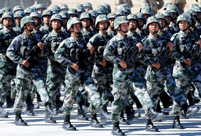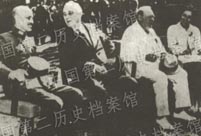 YOG kicks off in Nanjing
YOG kicks off in Nanjing
 Colorful life at Youth Olympic Village of Nanjing 2014 YOG
Colorful life at Youth Olympic Village of Nanjing 2014 YOG
 Royal Taoist temple to open to public
Royal Taoist temple to open to public
 Female soldiers at quake-hit area
Female soldiers at quake-hit area
 Shocking photos of cruel battles in Ukraine
Shocking photos of cruel battles in Ukraine
 Amphibious armored vehicle unit conducts open sea drill
Amphibious armored vehicle unit conducts open sea drill
 Water relay in Henan
Water relay in Henan
 Ethnic culture feasts eyes of travelers
Ethnic culture feasts eyes of travelers
 80 security dogs assembled in Nanjing police dog training base
80 security dogs assembled in Nanjing police dog training base
 Graffiti artists paint on street walls in Xinjiang
Graffiti artists paint on street walls in Xinjiang
Since 2013, China has been engaging in "major power" diplomacy. In the past, the term "major powers" referred to countries such as the US, Japan, Russia, the UK and Brazil, while now the major power is China itself.
The shift in China's diplomatic status means the country's diplomatic approaches face a new challenge: Does diplomacy have to distinguish between enemies and friends?
Before China's non-alignment policy was raised in the report to the 12th CPC National Congress in 1982, China's diplomacy distinguished between enemies and friends.
In the 1950s, based on the different social systems, China categorized other countries into imperialist states, capitalist states, nationalist states and socialist ones.
In the following two decades, these countries were divided into the superpowers, developed countries and developing ones, given the international status of different countries.
These two categorizations differ in standards, but reflected the then diplomatic notion of distinguishing between enemies and friends.
The report to the 12th CPC National Congress also said that "the Five Principles of Peaceful Coexistence are applicable to our relations with all countries, including socialist countries."
From then, China began to discard the "enemies-or-friends" concept and focus on economic cooperation with all the countries based on an equal footing.
There have been some variations in China's diplomacy, particularly in relation to how it categorized other countries after the Tiananmen incident in 1989.
One means adopted in 1997 classified the countries into neighboring, developing and developed ones. In 2002, the sequence was changed into developed, neighboring and developing countries.
Such categorization adds flexibility to diplomatic principles and, as some believed, fits the globalization era and discards the Cold War mentality that stuck to the old way of distinguishing between enemies and friends.
However, such categorization and sequence also have their flaws. When a principle is too flexible, its guiding role is weakened.
For instance, both Cambodia and the Philippines are China's neighboring countries and belong to developing countries, but the latter can sometimes pose diplomatic trouble for China.
Similarly, Russia and Japan belong to the same category, but we can enhance strategic cooperation with Russia while isolating Japan politically.
In the following decade, the overall national strength of China will remain greater than that of all the other countries except the US. China has to shoulder more international responsibilities and maintain international order by providing public benefit, so as to maintain its own interests.
But if China doesn't distinguish between enemies and friends, it will find it difficult to do so.
Only when China is clear about which country it can hold responsible on certain occasions, or which country can enjoy more public benefits, can it make the right decision.
Any big country, when helping shape international order, will protect its friends rather than enemy countries. It will raise proposals beneficial for its partners rather than competitors, and provide public benefit for those playing by the rules rather than breaking the rules.
If we don't distinguish between enemies and friends, it will also be difficult for us to adopt the diplomatic principle of amity, sincerity, mutual benefit and inclusiveness.
For example, politically we can get close to Russia and Cambodia but not Japan's Abe government or the Philippines' Aquino III government, because otherwise the latter two may dare to adopt even more hostile policies toward China.
Diplomatically, we can stick to the principle of credibility only with countries that we have established diplomatic ties with, but not with those who don't admit China's sovereignty or support the so-called "Taiwan independence." Economically, China can take the initiative to help developing countries rather than the US which has already entered the developed phase.
To build up an international environment that best works for China's rejuvenation, China's categorization of foreign countries can be based on interests.
We can classify all the countries into friendly, cooperative, ordinary or conflicting ones.
To friendly countries, China should lend a helping hand; to cooperative ones, it can offer some preferential policies. We should work on an equal footing with ordinary countries, while taking countermeasures to conflicting ones.
The US is the only country that is more powerful than China. We may consider listing China's relationship with it in a single category as "a new type of major power relationship."
It is a relationship between a rising country and a dominant one, and as the US is more powerful than China, the two should stay equal and be mutually beneficial, which is more favorable to the US. Therefore, this also reflects tolerance of China's foreign policies.
Since the Opium Wars in the 19th century, China has accumulated rich diplomatic experience to counter countries stronger than itself. But in modern times, it lacks the experience of dealing with countries weaker than itself. It tests China's diplomatic wisdom as whether or not to distinguish between enemies and friends.
The author is director of the Institute of Modern International Relations, Tsinghua University.
 Special holidays
Special holidays World's top 10 fighters
World's top 10 fighters 'Stewardesses' serve in hospital
'Stewardesses' serve in hospital Beautiful night scenery of Nanjing
Beautiful night scenery of Nanjing ‘Peace Mission -2014’ joint anti-terror military exercise kicks off in China
‘Peace Mission -2014’ joint anti-terror military exercise kicks off in China Eye-catching guides at the opening ceremony of YOG in Nanjing
Eye-catching guides at the opening ceremony of YOG in Nanjing A female missile launch company of PLA
A female missile launch company of PLA China, the U.S., Britain and the Soviet Union call for Japan's unconditional surrender
China, the U.S., Britain and the Soviet Union call for Japan's unconditional surrender The biggest duty-free store of the world
The biggest duty-free store of the world Volunteers bid farewell to YOG
Volunteers bid farewell to YOG More police dogs join anti-terror campaign in Inner Mongolia
More police dogs join anti-terror campaign in Inner Mongolia Picturesque Dayilan Manchu village in NE China
Picturesque Dayilan Manchu village in NE China Athletes experience the charm of Chinese traditional opera in Nanjing
Athletes experience the charm of Chinese traditional opera in Nanjing Contestants for Miss Bikini World experience Chinese traditional culture
Contestants for Miss Bikini World experience Chinese traditional cultureDay|Week|Month